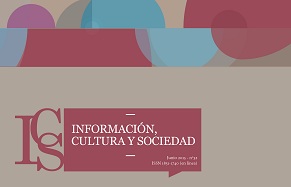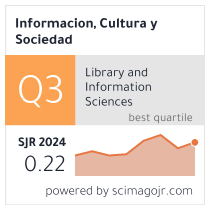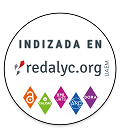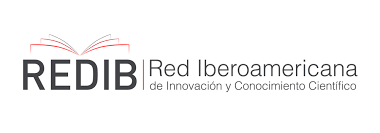Readers in the city of Córdoba, Argentina: An approach to reading practices before and during the pandemic
Abstract
This paper analyzes reading as a cultural practice of the population of the city of Córdoba (Argentina). It is based on the final survey “Cultural activities in Córdoba. The impact of the pandemic” carried out in May 2021 by the research team: “Tramas de la cultura III”. The semi-structured questionnaire consists of three blocks: one concerning the usual cultural activities carried out pre-pandemic, another referring to the period of strict isolation, and a third when certain restrictions were partially lifted. A proportional statistical sampling was used. A total of 400 households were visited and one person over 18 years of age responded in each home. Reading is understood in a broad manner, including literature in general, magazines, and press, without distinction of the support or device in which the practice is carried out. The results obtained show the characterization of readers in the city of Cordoba in terms of gender, age, socioeconomic and educational level, reading preferences, relationship with other cultural activities, and the impact of the pandemic on the practice.Downloads
References
Albarello, Francisco. 2011. Leer/navegar en internet: las formas de lectura en la computadora. Buenos Aires: La Crujía
Angelozzi, Silvina Marcela. 2017. El libro digital. Nuevos modos de relación con lo escrito: lectura en e-readers. Córdoba: Facultad de Ciencias de la Comunicación. Universidad Nacional de Córdoba, Argentina, 2017. 479 p. Tesis de doctorado.<https://hdl.handle.net/11086/6271> [Consulta: 15 set 2022]
Bahloul, Joëlle. 2002. Lecturas precarias. Estudio sociológico sobre los “pocos lectores”. México: Fondo de cultura económica.
Boito, María Eugenia; María Belén Espoz Dalmasso y Fabiana Martínez, eds. 2022. Consumos mediáticos, culturales y tecnológicos: Ciudad de Córdoba en contexto de pandemia. Córdoba: Facultad de Ciencias de la Comunicación. Universidad Nacional de Córdoba. <http://hdl.handle.net/11086/25034> [Consulta: 15 set 2022]
Bourdieu, Pierre. 2000. La distinción. Criterios y bases sociales del gusto. 2 ed. Madrid: Taurus.
Cavallo, Guglielmo y Roger Chartier. 2011. Historia de la lectura en el mundo occidental. Buenos Aires: Taurus.
Chartier, Roger. 2021. Leer en tiempos de pandemia. En Nueva Sociedad. No 296, 31-39 <https://nuso.org/articulo/leer-tiempos-pandemia/> [Consulta: 15 set 2022]
Fish, Stanley. 1976. Interpreting the ‘Variorum’. En Critical Inquiry. Vol. 2, no. 3, 465-485
Gigena, Daniel. 2021. Librerías: en 2020, las ventas digitales crecieron y las redes sociales le ganaron a Mercado Libre. En La Nación, 23 marzo 2021. <https://bit.ly/3SgxXLj> [Consulta: 15 set 2022]
Hoggart, Richard. 2013. La cultura obrera en la sociedad de masas. Buenos Aires: Siglo veintiuno
Lahire, Bernard. 2004. Sociología de la lectura. Barcelona: Gedisa.
Maina, Melisa y Vanina Papalini. 2021. Lectura(s) hacia una revisión del concepto. En Álabe: Revista de Investigación sobre Lectura y Escritura. No. 23. <https://doi.org/10.15645/Alabe2021.23.5>
Moreno, Hilario; Santiago García y Valeria Sardi. 2014. Lectores, libros, lecturas: cambios en las prácticas y hábitos de lectura: incluye los resultados de la Encuesta Nacional de Hábitos y Prácticas de Lectura 2011. Buenos Aires: Secretaría de Cultura de la Presidencia de la Nación.
Papalini, Vanina. 2012. Las lecciones de los lectores. A propósito de la recepción literaria. En Álabe: Revista de Investigación sobre Lectura y Escritura. No. 6. <https://doi.org/10.15645/Alabe.2012.6.1>
Papalini, Vanina y Emanuel Niño. 2019. Las lectoras del género rosa y los imaginarios del amor. Circulación y recepción de las novelas de Florencia Bonelli. En Saintout, Florencia, ed. Públicos: aproximaciones empíricas desde la comunicación en Argentina. La Plata: Universidad Nacional de La Plata, p.158-179.
Paquienséguy, Françoise y Sylvie Bosser. 2014. Introduction: Le livre numérique en questions. En Études de communication. No. 43, 9-16. <https://doi.org/10.4000/edc.5962>
Parodi, Giovanni; Tomás Moreno de León; Cristóbal Julio y Gina Burdiles. 2019. Generación Google o Generación Gutenberg: hábitos y propósitos de lectura en estudiantes universitarios chilenos. En Comunicar. Revista científica de Comunicación y Educación. Vol. 27, no. 58, 85-94. <https://doi.org/10.3916/C58-2019-08>
Roubakine, Nicolas. 1922. Introduction a la psychologie bibliologique: la psychologie de la creation des livres, de leur distribution et circulacion, de leur utilisation par les lecteurs, lesécoles, les Bibliothèques, les Librairies, etc. - Théorie et Pratique. Paris: J. Povolozky.
Salas Tonello, Pablo; Paula Simonetti y Boris Papez. 2021. En casa. Consumos, prácticas culturales y emociones en la vida cotidiana durante la pandemia por covid-19 en Argentina. En Revista Brasileira de Sociologia da Emoção. Vol. 20, no. 58, 53-65. <http://hdl.handle.net/11336/133870> [Consulta: 2 junio 2022]
SInCA. Sistema de Información Cultural de la Argentina. 2013. Encuesta nacional de consumos culturales 2013. <https://www.sinca.gob.ar/VerDocumento.aspx?IdCategoria=1> [Consulta: 2 junio 2022]
SInCA. Sistema de Información Cultural de la Argentina. 2017. Encuesta nacional de consumos culturales 2017. <https://www.sinca.gob.ar/VerDocumento.aspx?IdCategoria=1> [Consulta: 2 junio 2022]
Waples, Douglas; Bernard Berelson y Franklyn R.Bradshaw. 1940. What reading does to people. Chicago: The University of Chicago Press.
Authors publishing in this journal acknowledge the conditions below:
- Authors retain the copyright of their work while they transfer the right of the first publishing to the journal, under the Creative Commons Attribution-ShareAlike 4.0 International (CC BY-SA 4.0) Licence, which allows third parties to reproduce them under the condition that express mention is given to the author and to its original publication in the journal.
- Authors may enter into other contractual and independent arrangements for the non-exclusive distribution of the version of the article published in this journal (for instance, it can be published in an institutional repository or in a book). In any case, an express mention should be given to its first publication in the journal.
- It is permitted and encouraged to publish online the articles (for example, on institutional or personal pages).


























